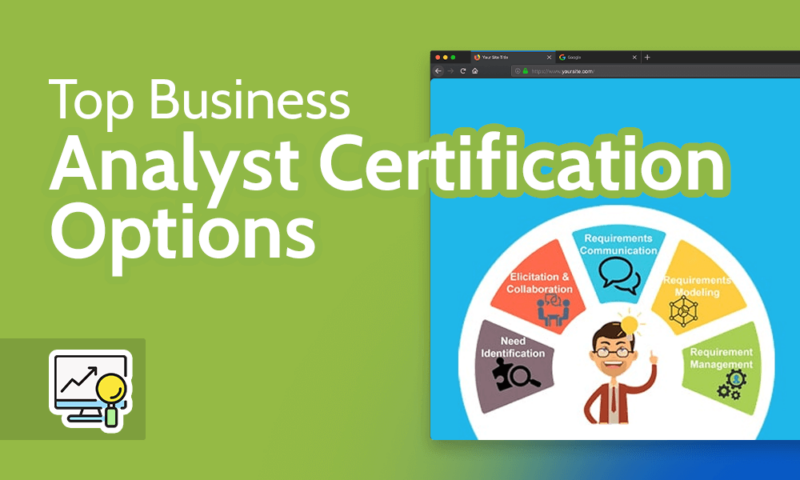10 Top Business Analyst Certification Options in 2024
The U.S. Bureau of Labor Statistics says the business and finance sector is growing faster than the average for all occupations. With an estimated 911,400 job openings each year, the market for business analysts is ripe for the picking. Now is the time to obtain a business analyst certification.
Key Takeaways: Top Business Analyst Certification
- There are business analyst courses for newcomers and experienced individuals.
- Data has shown that the business and finance sectors are growing faster than most, so now is the time to pursue a certification.
- If you want to earn the respect of your peers and enhance your job and salary potential, you owe it to yourself to become a certified business analyst.
If you’re set on becoming a business analyst but aren’t sure which business analyst certification you should pursue, you’re in the right place. In this guide, we’ll share the most popular and well-respected certifications from some of the best institutions around.
By the end of this guide, you’ll be able to make an informed decision regarding your continuing education. Obtain one of the certifications below, and you’ll become a vital member of any organization that takes an analytical approach to operations and any project management team. Let’s take a closer look at the top certifications you should consider.
What Makes the Best Business Analyst Certifications?
There are many things to look for in business analyst certifications. You need to ensure that the courses and examinations are offered by accredited institutions and cover the key concepts and critical components of the role in which you’re interested. All of the certifications listed below have all of these bases covered.
- Business Analysis Fundamentals Certification – An entry-level course for aspiring business analysts.
- Entry Certification in Business Analysis (ECBA) – Ideal for entry-level business analysts with little experience.
- Certification of Competency in Business Analysis (CCBA) — For business analysts with plenty of experience.
- Simplilearn Business Analyst Master’s Program — Accredited by the IIBA, this course covers many business analysis bases, including SQL, Tableau and Python analysis.
- Professional of Business Analysis Certification (PBA) — For highly experienced business analysts with project team and product development experience.
- Foundation-Level Business Analyst Certification (CFLBA) — For product owners, systems analysts, marketing managers and more wanting to jump into business analysis.
- IIBA Certification in Business Data Analytics (CBDA) — The second level of certification offered by the IIBA.
- Agile Analysis Certification (AAC) — For business analysts wishing to become an Agile team member.
- Certified Business Analysis Professional (CBAP) — For analysts with significant experience in the field.
- Certified Analytics Professional (CAP) — A highly sought-after, independently verified certification.
As you can see, we have selected a wide range of certifications for business analysts of all experience levels. It’s worth mentioning that our list does not list the certifications in order from best to worst. They are listed in no particular order and are all here based on merit. It’s hard to go wrong with any of them.
10 Best Business Analyst Certification Options
Now we’ll take a closer look at the business analyst certifications listed above. You’ll learn about the courses and what they cover, any required prerequisites, how much they cost and much more. Let’s dive right in.
1. Business Analysis Fundamentals Certification
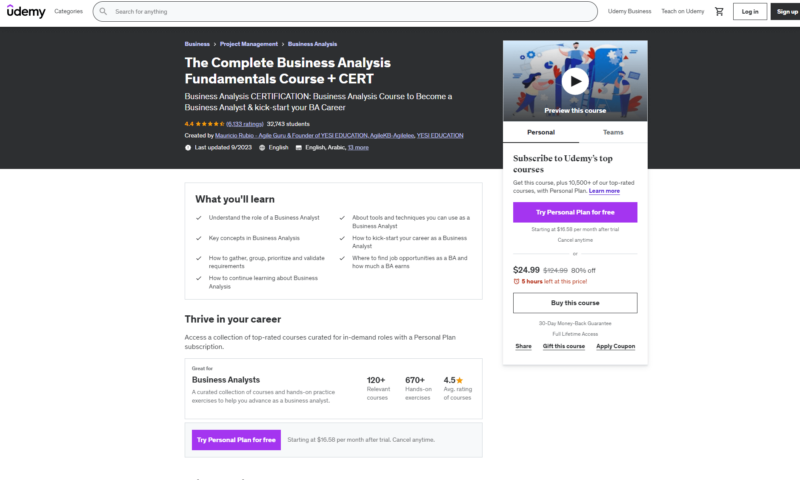
exploring the business analyst role.
More information about Business Analysis Fundamentals Certification:
- Cost: $124.99
- Prerequisites: None
Pros:
- Incredibly affordable
- Covers the basics
- 2 certificates on completion
Cons:
- Not as widely recognized as other certifications
The Business Analysis Fundamentals course and certification offered by Udemy is the perfect choice for individuals wanting to start their business analyst journey. This entry-level course will teach you basic role concepts, how to use common tools and techniques, how to group, prioritize and validate business requirements, where to find jobs and more.
The course, which offers four hours of on-demand video, six articles and 94 downloadable resources, comes with a 30-day money-back guarantee. There are no prerequisites. The course can be completed quickly and will provide you with a certificate upon completion. If you want to explore the business analyst role, this course is for you.
2. Entry Certification in Business Analysis (ECBA)
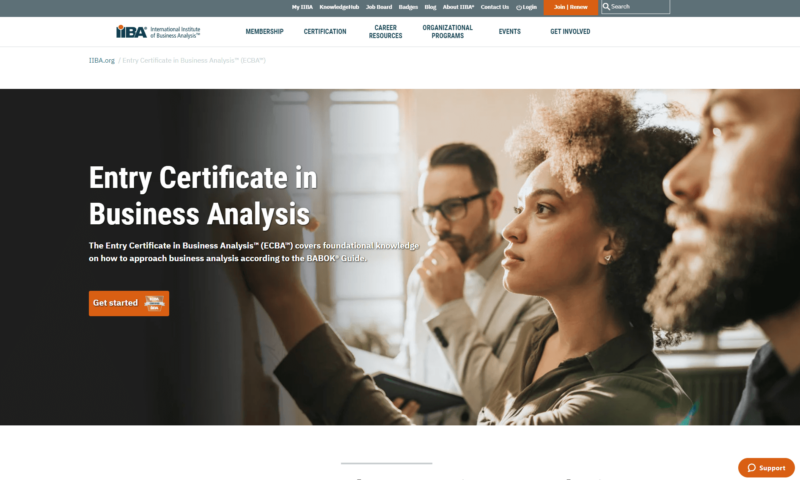
More information about Entry Certification in Business Analysis (ECBA):
- Cost: $195 for IIBA members, $350 for non-members and $150 for corporate members.
- Prerequisites: Register an IIBA account and agree to the terms. No prior experience is needed.
Pros:
- Highly respected certification
- No yearly renewals
- Online testing
Cons:
- Steep price increase for non-IIBA members.
Offered by the International Institute of Business Analysis (IIBA), the Entry Certification in Business Analysis (ECBA) is based on the Business Analysis Body of Knowledge (BABOK). Those wishing to sit for the exam, which covers key concepts, underlying competencies, techniques, and more, can prepare by enrolling in a prep course or by self-studying.
The ECBA exam has 50 multiple-choice questions and must be completed in one hour. Two more advanced certifications offered by the IIBA, the CCBA and the CBAP (covered below), will be required if you want to hold more senior business analyst roles. For those looking for ground-level business analyst positions, the ECBA certification is for you.
3. Certification of Capability in Business Analysis (CCBA)
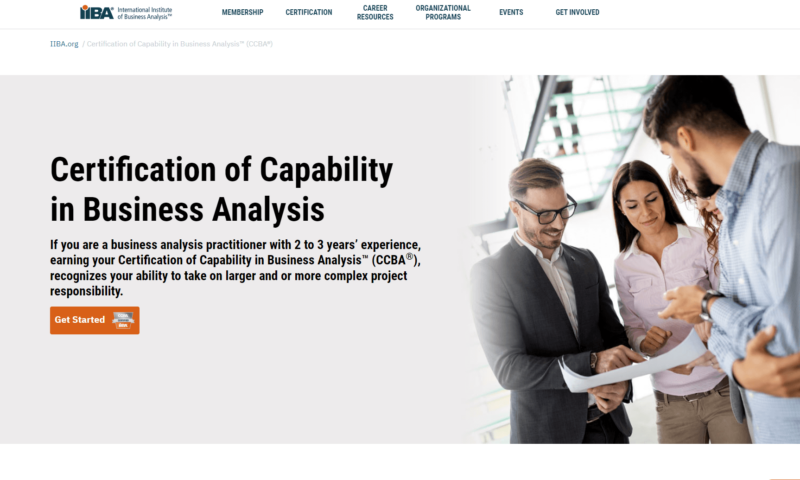
business analysts wishing to further their careers.
More information about the Certification of Capability in Business Analysis (CCBA):
- Cost: $145 application fee. Certification fees: $250 for members, $405 for non-members, $205 for corporate members. Renewal every three years costs $85 for members and $105 for non-members.
- Prerequisites: 3,750 hours of business analysis work experience over the last seven years. Must complete 900 hours in two out of six BABOK guide knowledge areas or 500 hours in four of the BABOK knowledge areas. At least 21 hours of professional development in the previous four years. Must provide professional references.
Pros:
- Proven analysis acumen
- Exams can be taken online
Cons:
- 3-year renewal required
- Higher fees for non-members
The Certification of Capability in Business Analysis will prove to a potential or current employer that you have the required abilities and knowledge to work successfully as an advanced business analyst. Before registering for the exam, you must prove you have 3,750 hours of business analysis experience and robust BABOK knowledge.
Like the preceding ECBA course, individuals can take a preparation course or self-study for the exam. The exam covers planning and monitoring, elicitation and collaboration, lifecycle management, strategy analysis, requirements analysis and design definition, and solution evaluation. Be prepared to answer 130 multiple-choice questions over three hours.
4. Simplilearn Business Analyst Master’s Program
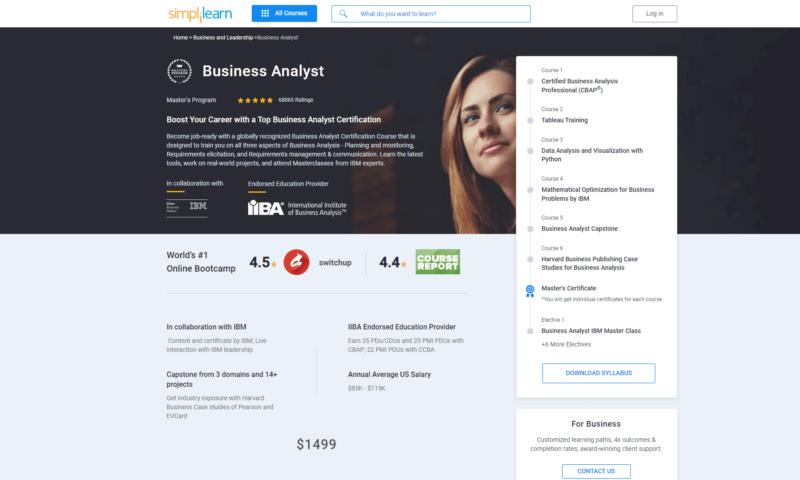
with IBM and is accredited by the IIBA.
More information about the Simplilearn Business Analyst Master’s Program:
- Cost: $1,499
- Prerequisites: A bachelor’s degree in any discipline and a basic understanding of mathematics and statistics.
Pros:
- Accredited by the IIBA
- Globally recognized
- Offers multiple electives
Cons:
- Expensive
Accredited by the IIBA, the Business Analyst Master’s course by Simplilearn is ideal for those looking to change careers. The course is divided into multiple steps and covers all business analyst concepts and fundamentals. It also features numerous electives that let you earn a CCBA certification and certifications in Python, Agile Scrum and the Digital Transformation Course for Leaders.
The course fee is higher at $1,499, but will allow you to go from zero to a respected business analyst in one swoop. Completing the course will award you with 25 professional development units (PDUs) and 35 IIBA credits. The one-year course awards participants with individual certifications in all competencies and offers practice exams and access to teaching assistants.
5. Professional of Business Analysis Certification (PBA)
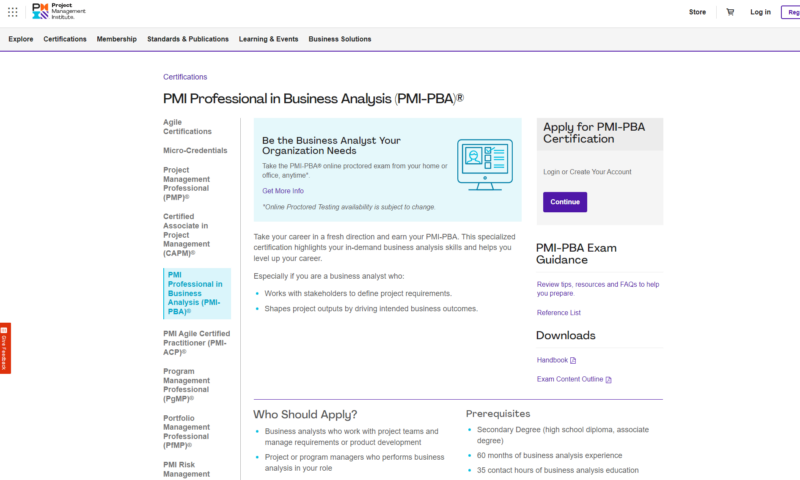
More information about the Professional of Business Analysis Certification (PBA):
- Cost: $405 for PMI members, $555 for non-members
- Prerequisites: Secondary degree, 60 months of business analysis experience, 35 contact hours of business analysis education or a bachelor’s degree or global equivalent, 36 months of business analysis experience and 35 contact hours of business analysis education.
Pros:
- Highly respected certification
- Helps demonstrate business analyst competencies
Cons:
- Expensive for non-members
- 3-year renewal required
- Numerous prerequisites
The Project Management Institute offers experienced business analysts the Professional of Business Analysis certification. To qualify for the certificate, you must apply and prove that you have the required experience and knowledge to sit for the exam, which covers needs assessment, planning, analysis, traceability and monitoring, and evaluation.
The exam features 200 multiple-choice questions and lasts four hours. Interestingly, the Project Management Institute does not publish the minimum passing grade for this certification.
If you want to pay less for the exam ($405), you can become a PMI member. Non-members will be asked to pay $555. The certificate must be renewed every three years. To renew, you must obtain 60 PDUs and pay a fee. The PMI does not list the fee.
6. Foundation-Level Business Analyst Certification (CFLBA)
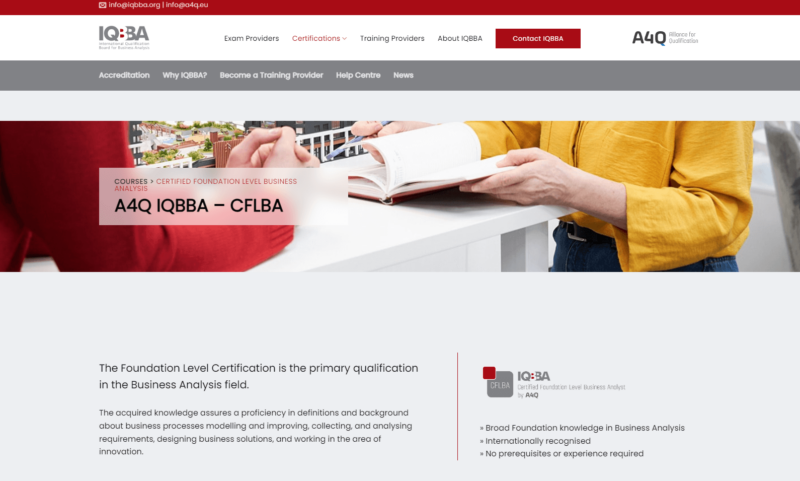
has no prerequisites.
More information about Foundation-Level Business Analyst Certification (CFLBA):
- Cost: Exam $265
- Prerequisites: No prerequisites or experience needed
Pros:
- Affordable
- No experience needed
Cons:
- Few exam providers
- Most partners are EU-based
The Foundation-Level Business Analyst Certification (CFLBA) is geared toward current business and systems analysts, product managers, product owners (check out our roundup of Scrum certifications), marketing managers and others who want to enter the business analysis field or prove their current knowledge.
Numerous training partners offer CFLBA preparation services, and there are a couple of exam providers. The exam covers topics such as fundamentals of business analysis, strategy definition, business analysis process management, requirements engineering in business analysis, and solution evaluation and optimization.
The 60-minute exam gives non-native speakers 25% extra time to finish. You are required to answer 65% of the questions correctly. If you want an affordable certification that will help you land entry-level business analyst roles, check out the CLFBA. Once you hold the CLFBA, you can sit for the advanced Certified Advanced Level Business Analysis (CALBA) exam.
7. IIBA Certification in Business Data Analytics (CBDA)
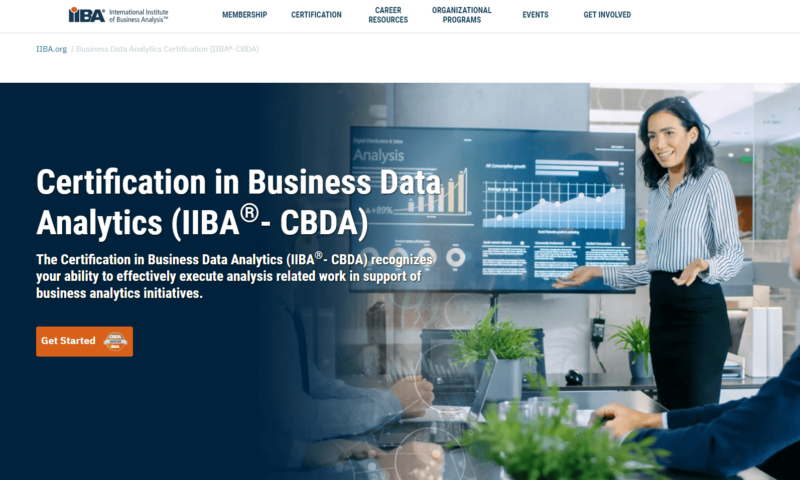
More information about IIBA Certification in Business Data Analytics (CBDA):
- Cost: $250 for members, $400 for non-members, $225 for corporate members. Yearly renewal fee is $30 for members and $50 for non-members.
- Prerequisites: Some practical experience and general knowledge of business analyst competencies are recommended.
Pros:
- No prerequisites
- Internationally recognized
Cons:
- Steep price for non-members
- Yearly renewal required
Per the IIBA’s website, the Certification in Business Data Analytics is ideal for individuals who want to show that they have the “ability to effectively execute analysis-related work in support of business analytics initiatives.” In other words, this certification proves you have a solid grasp of key competencies and skills needed to be successful in this field.
Following the entry-level ECBA certification, the CBDA certification takes things one step further by challenging your ability to source and analyze data and identify research questions. It also looks to see if you can read and interpret reports, use results to influence business decision-making and guide company-level strategies.
You can quickly find CBDA preparation courses to help prepare you for the exam. The exam consists of 75 multiple-choice questions and must be finished within two hours. The CBDA certification must be renewed yearly for $30 for IIBA members or $50 for non-members. If you’re ready to take the next step in your business analytics career, this course is for you.
8. Agile Analysis Certification (AAC)
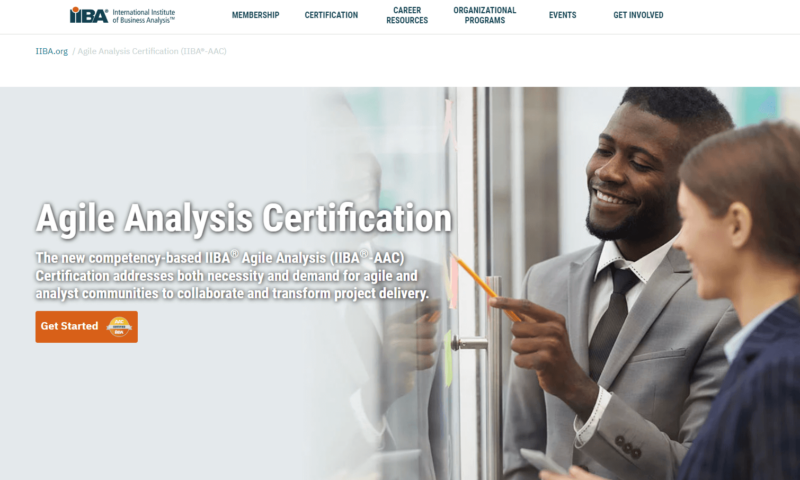
More information about Agile Analysis Certification (AAC):
- Cost: The exam fee for IIBA members is $250, $400 for non-members and $225 for corporate members. Yearly renewal costs $30 for members and $50 for non-members.
- Prerequisites: None
Pros:
- Co-made with Agile Alliance
- Covers business analysis in Scrum, Extreme XP, Lean & Kanban frameworks
Cons:
- Yearly renewal
If you want to be a business analyst in the world of Agile project management, the IIBA Agile Analysis Certification (IIBA-AAC) is for you. This certification will help you work with Kanban and Scrum, Lean, Extreme Programming and other project management methodologies. The certificate will prove that you can transform and deliver projects within Agile frameworks.
There are preparation courses that cost roughly $300 that you can take to help you prepare for the certification, or you can self-study. The exam covers four competencies: Agile mindset, strategy horizon, initiative horizon and delivery horizon. Needless to say, this course has been designed for individuals already familiar with business analysis and Agile frameworks.
The live online exam, which is based on the Agile Extension (co-developed with the Agile Alliance) and the BABOK, has 85 multiple-choice questions and must be completed within two hours. If you’re already a member of an Agile team and wish to move into a new role, this certification will help you do that.
9. Certified Business Analysis Professional (CBAP)
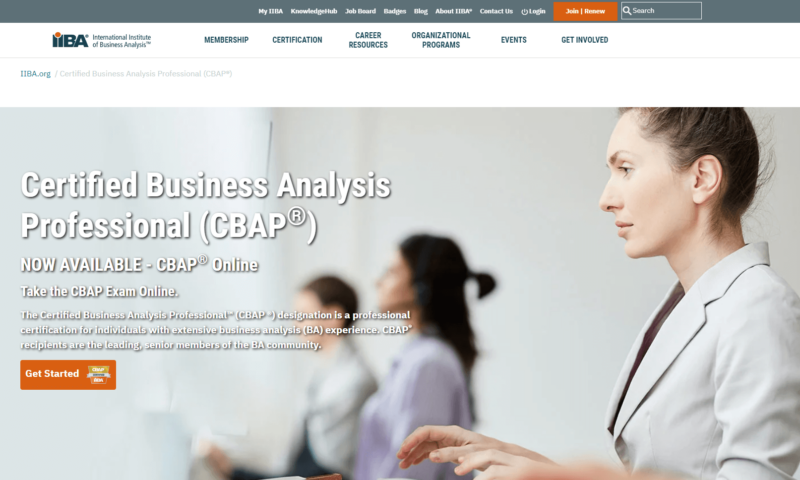
senior management and analyst roles.
More information about Certified Business Analysis Professional (CBAP):
- Cost: $145 application fee. $350 member exam fee, $505 exam fee for non-members, $305 fee for corporate members. Must renew every three years. IIBA member renewal fee is $85, and non-members pay $120.
- Prerequisites: 7,500 work hours as a business analyst during the past 10 years. 900 hours completed in four out of six BABOK knowledge centers, for a total of at least 3,600 hours of the 7,500 required hours. At least 35 hours of professional development over the last four years. Professional references. Successful completion of the examination.
Pros:
- Highly respected
- Can be completed online
Cons:
- Must renew every 3 years
- Numerous prerequisites
The Certified Business Analysis Professional (CBAP) certification, offered by the IIBA, is one of the most prestigious — and hardest to obtain — certificates for analysts. The prerequisites of 7,500 hours of work experience over 10 years and near-perfect knowledge of BABOK competencies show that this course is only for highly experienced analysts.
Like the other IIBA certifications listed here, you can enroll in one of many preparation courses or use your experience and self-study for the examination. Be prepared to study business analysis planning and monitoring, elicitation and collaboration, lifecycle management, strategy analysis, requirements analysis and design definition, and solution evaluation.
When you sit for the final exam, you’ll face 120 multiple-choice questions over three and a half hours. If you’re ready to prove that you have senior management potential and start earning significantly more money, this globally recognized certification CBAP should be on your radar.
10. Certified Analytics Professional (CAP)
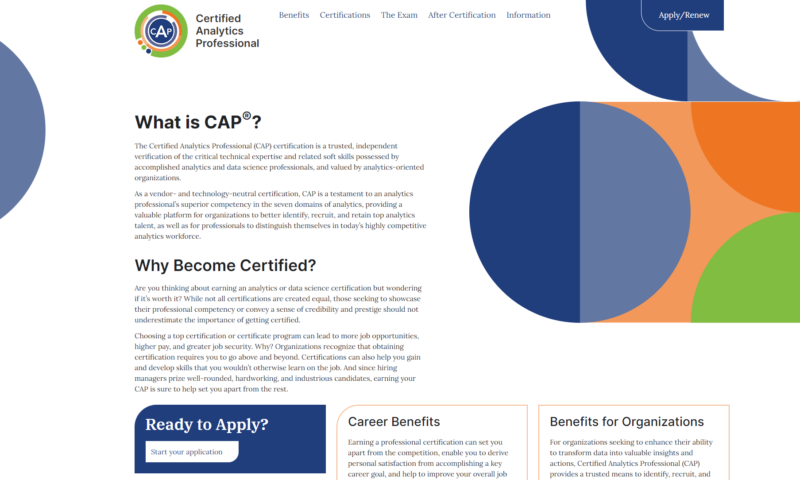
More information about Certified Analytics Professional (CAP):
- Cost: INFORMS members $495, non-members $695
- Prerequisites: Bachelor’s or master’s degree. Three years with an M.A./M.S. in a related field, five years with a B.A./B.S. in a related field, or seven years with any degree in an unrelated analytics area. Confirmation of skills from your employer, a pledge to the ethics guidelines and passing the exam.
Pros:
- Highly wanted certification
- Independent verification of technical expertise
Cons:
- Renewal after 3 years
The CAP certification is for business analysts who wish to prove they can make sound business decisions from highly complex data sets. There isn’t a required CAP business analysis course as you are expected to have the knowledge and skills required before applying, but INFORMS offers one. The course fee is $630 for INFORMS members and $720 for non-members.
The CAP examination is based on the Job Task Analysis (JTA), which was developed by subject matter experts. There are seven areas in which applicants should be proficient. The areas are business problem framing, analytics problem framing, data, methodology selection, model building, deployment and lifecycle management.
Once accepted, applicants can take the examination at a test center or online. You’ll face 100 multiple-choice questions and will need to score roughly 70% to pass. To renew the certification, you must obtain 30 professional development units over three years and pay a fee. The CAP certification is not easy to obtain, but is worth the effort if you wish to enhance your career.
Why Are Advanced Business Analysis Certifications Beneficial For Your Career?
A business analysis certification will show employers that you are passionate about business analytics and have business analysis skills. The benefits of being certified include more job opportunities, enhanced pay and the respect of your peers. Pursuing and obtaining a certification is the best thing to do if you want to further your business analysis career.
Final Thoughts: Getting Your Business Analysis Certification
If you want to get ahead in the field of business analysis, there’s no better way than pursuing personal and professional development. Fortunately, there are numerous certifications and business analyst courses that will help you show prospective employers that you have the passion and the skills needed to join their teams.
If you want to earn the respect of those around you, open up numerous job opportunities and enhance your earning potential, take a closer look at the courses we have covered. Do any of the listed courses stand out to you? Have you taken a business analyst course that we haven’t covered? Let us know in the comments, and as always, thanks for reading.
FAQ: Analyst Certifications
Any of the certifications we have listed in this guide will serve you well. Only you can determine which is the best course for you.
Of course. If you want to further your career, earn the respect of those around you and increase your earning potential, you’ll need a business analyst certification.
A level 1 business analyst is in an entry-level role. Typically, a level one analyst reports to a senior member of management. General work will include gathering data, maintaining business processes and acting as a liaison between departments and managers.
A business analytics certification will help individuals show prospective employers that they have a firm grasp on analytics initiatives and business analysis competencies.
